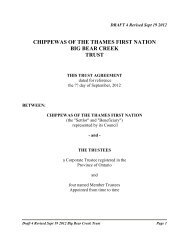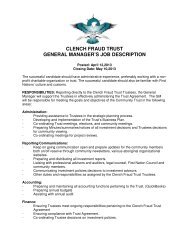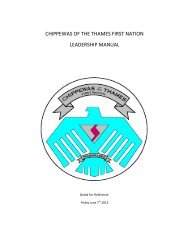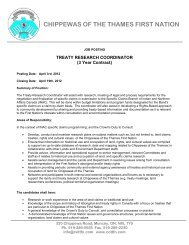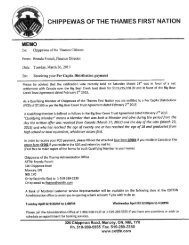CHIPPEWAS OF THE THAMES COMMUNITY STORY - Cottfn
CHIPPEWAS OF THE THAMES COMMUNITY STORY - Cottfn
CHIPPEWAS OF THE THAMES COMMUNITY STORY - Cottfn
Create successful ePaper yourself
Turn your PDF publications into a flip-book with our unique Google optimized e-Paper software.
community council where consensus was reached on how to proceed. Chiefs and<br />
their sub-chiefs (like counselors) didn‘t just decide things their own. They sought<br />
consensus from the people, and then they acted to implement the decisions required.<br />
Implementation of decisions meant mobilizing community members to do things (or<br />
stop doing them) and leadership roles were to coordinate these actions. Spiritual<br />
leaders provided continuous guidance to the process reminding everyone of the<br />
teachings, as well as the duties and responsibilities the sacred teachings required of<br />
everyone.<br />
b. This system was gradually undermined after contact with Europeans, especially after<br />
the formation of Canada and the passing of the Indian Act, which imposed a<br />
municipal manager and council model on Indigenous Reserve communities. Also, the<br />
Indian agent system carried on into the 1950s, ensuring that a non-native manager<br />
controlled most real decision-making, especially related to finances.<br />
c. The current pattern, which really amounts to Indigenous communities serving as local<br />
managers of federal programs being run in their territories, emerged during the 1960s<br />
and 70s. That system doesn‘t understand or even respect our cultural way of doing<br />
things.<br />
d. The historical changes in our governance and community systems made us more and<br />
more dependant in our thinking. We began to see this system itself as our ―treaty<br />
right‖, instead of focusing on our community development process and creating our<br />
own governance system.<br />
3. What will things be like politically in a positive future?<br />
In a positive future, COTT will have its own election code and legislation that are in<br />
line with its traditions. We will be self-governed and sovereign, without having every<br />
aspect of life controlled by external rules and conditions. This will mean that we will<br />
have sufficient own-source income to allow us to implement the programs and initiatives<br />
that are most important to us without interference from outside governments. The elders<br />
will give advice to the leaders, and leaders will take that advice seriously.<br />
Leaders will think of themselves as servants of the people. They will set an example<br />
and make sure that people who need support are looked after, but at the same time they<br />
will not use their positions to keep people dependent. They will work toward self-reliance<br />
for all. Leadership will have their own job descriptions, and will be accountable (just as<br />
staff is now) before the community.<br />
Chippewas of the Thames Community Story<br />
October 2011<br />
49



